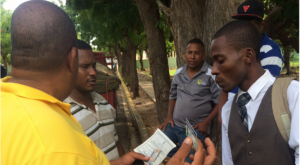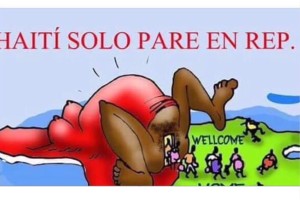This post is also available in: Kreyol
“All Haitians del Diablo on this bus, come forward so we can verify your papers!” These were the words of a Dominican immigration officer stopping the bus I was on while traveling from Perdenales to Barahona, Dominican Republic. With scorn in his eyes, the immigration officer made all the black people on the bus step forward to have their papers checked.
 During six hours of travel between Perdenales and Barahona, our bus was stopped by Dominican immigration four times. These security checkpoints are targeted specifically towards Haitans, and they are a source of corruption. Dominican soldiers and immigrations use this to force Haitian immigrants to pay them off even if their papers are legal.
During six hours of travel between Perdenales and Barahona, our bus was stopped by Dominican immigration four times. These security checkpoints are targeted specifically towards Haitans, and they are a source of corruption. Dominican soldiers and immigrations use this to force Haitian immigrants to pay them off even if their papers are legal.
This incident occurred when the bus reached the final security checkpoint between Perdenales and Barahona. I know for sure that everyone on the bus had proper documentation because we had gone through all the prior checkpoints successfully. One armed immigration officer claimed that the documents of a child onboard were not legal, a five-year old traveling with her parents. The officer took the child’s birth certificate and left the bus with it, he returned demanding that the parents pay 100 pesos to be let through. We spent more than 25 minutes at this checkpoint as the parents argued with the officers. After a long discussion, the bus finally left, the parents stood firm and did not pay. Not the driver, or any Dominican on the bus stepped in to help this family, even though everybody knew their papers were in order, and the officer was acting illegally.
Throughout all the checkpoints on this trip, the black people on the bus were subject to verification of papers and questioning. Each time the bus was stopped, the black people were picked out immediately for questioning and checking. These are the frustrating circumstances that many people traveling between Haiti and the Dominican Republic are living through.
Jasmin Paul, 41 sells plantains, avocados and bananas in the DR “Bandits and immigration bother us all day. Even though I am going through the legalization process and waiting for the results, I am still threatened with deportation every day. Sometimes I have to pay money so that I don’t get arrested.”
Ever since I began working at the border, it was clear that anti-Haitianismo permeated everything in the Dominican Republic. When crossing the border with my fellow journalists who work in Haiti, those among us who are white go through without being questioned. Where as me, as a black person, as a Haitian, I am always stopped for questioning. Even though, I am here doing the same work as the rest of my team.
 On social media, this same anti-Haitian sentiment is present, you will find Dominican politicians using this immigration crisis to further their political agendas. One political party at the forefront of this is FNP Fuerza Nacional Progresista is led by anti-Haitian Deputy Vincio Castillo. Castillo is a candidate for the senate in the upcoming elections, his main mission is to build a wall separating Haiti from the Dominican Republic. Castillo and his party have already amassed 266,000 signatures in two weeks. Their plan is to collect one million signatures to force the Dominican government to build this wall.
On social media, this same anti-Haitian sentiment is present, you will find Dominican politicians using this immigration crisis to further their political agendas. One political party at the forefront of this is FNP Fuerza Nacional Progresista is led by anti-Haitian Deputy Vincio Castillo. Castillo is a candidate for the senate in the upcoming elections, his main mission is to build a wall separating Haiti from the Dominican Republic. Castillo and his party have already amassed 266,000 signatures in two weeks. Their plan is to collect one million signatures to force the Dominican government to build this wall.
Today, September 23rd, to mark the second anniversary of the Anti-Haitian law, several groups are protesting in support of law 168-13 and demanding more deportations because they are unsatisfied with the way their government is handling the deportations. They would rather see massive deportation and a wall built between the two countries.
The plight of Haitians in the Dominican Republic is quite complicated, particularly following this 2013 law that strips hundreds of thousands of people of their nationality. Two years after the passing of that law, discrimination has become institutionalized in the Dominican Republic. Whille the Dominican Republic is within its rights to regulate illegal immigration, it must do so while respecting international human rights laws.
The 2013 law has increased anti-Haitian sentiments and has legalized discrimination against Haitians. The law does not only have the effect of stripping people of Dominican nationality, it also has a direct effect on the violence and racial discrimination to which Haitians have become victims to in the Dominican Republic. My trip to Perdenales to Santo Domingo illustrated to me a new chapter in this Haiti-DR crisis. Many people will be victimized without any legal recourse. The way I was treated by Dominican immigration agents and soldiers was racist and discriminatory – but I am only passing through. That family that Dominican soldiers and immigration agents almost forced to pay money – despite being legal – lives in the Dominican Republic. The child whose papers they found to be insufficient, along with her family, will remain there; this is their everyday inescapable reality.

Hi Etant,
I think your article it´s well written, as a redaction. Congratulations!
Anyhow, I agree with you in some issues, and I disagree in others. The principal reason is because your generalization of the border problem with the all country.
I just wonder to know how many discriminative action against you or others you see in your dominican stay in Santo Domingo. I am sure, not too much, or you surelly was talking about it in this article.
The racism does not exist in Dominican Rep. we are black, we named ourself black, prieto, moreno, etc, with out any problem, we accept we are. in more or less capacity depend of the people.
But the problem between, it is not for racism, or black appearance, but just cultural, politic, and historic troubles. That´s all.
Of course, that´s my opinion. I live here, my forefathers are haitian and I have close friends and family from all over the world, I never felt discriminated for my origins as haitian. Of course, I recognize the problem of racism, but not just here in Dominican Rep., but in some other contries I was visited.